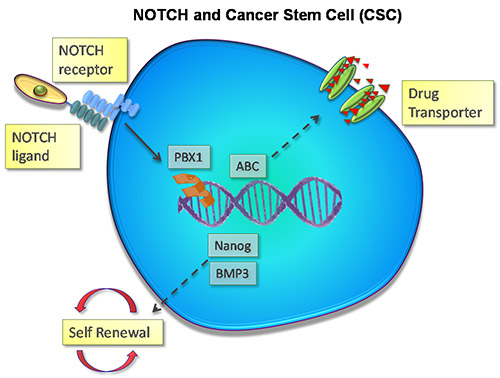One of the major obstacles to improving the dismal survival rate in patients with ovarian cancer is to overcome the development of chemoresistance to platinum-based therapy. Only a small fraction of women with ovarian cancer achieve long-term remission, as up to 75% women with ovarian cancers suffer from either intrinsic or acquired resistance to chemotherapy. Therefore, understanding the molecular mechanisms underpinning chemoresistance represents an unmet medical need.
Applying global genomic and proteomic approaches, we have identified several signaling pathways which are important in embryonic development are re-activated in chemoresistant tumors. Some of these pathways, such as the NOTCH 1-3 and SYK 4 pathways, also play roles in maintaining viable stem cell pools and in tissue regeneration in adults. Therefore, we hypothesize that the tissue damage induced by chemotherapy may trigger reactivation of signaling pathway(s) that function to generate a tissue environmental niche for cancer cell stem repopulation. Targeting these pathways can, in theory, restrict repopulation of cancer stem cells and prevent tumor recurrence. Clinical-grade small molecule inhibitors have been developed for both the NOTCH and SYK pathways. It is critical to test the efficacy of these drugs singly or in combination with chemotherapeutic agents in women who develop recurrent ovarian cancers.
To elucidate mechanistic details, we have investigated epigenetic regulation by NOTCH. More details can be found in the “Epigenomics in Cancer” section and in our recent publications.

References
- Park JT, Chen X, Trope CG, Davidson B, Shih Ie M, Wang TL. Notch3 overexpression is related to the recurrence of ovarian cancer and confers resistance to Carboplatin. Am J Pathol. Sep 2010;177(3):1087-1094.
- Park JT, Li M, Nakayama N, et al. Notch-3 gene amplification in ovarian cancer. Cancer Res. 2006;66:6312-6318.
- Park JT, Shih Ie M, Wang TL. Identification of pbx1, a potential oncogene, as a notch3 target gene in ovarian cancer. Cancer Res. Nov 1 2008;68(21):8852-8860.
- Yu Y, Gaillard S, Phillip JM, et al. Inhibition of Spleen Tyrosine Kinase Potentiates Paclitaxel-Induced Cytotoxicity in Ovarian Cancer Cells by Stabilizing Microtubules. Cancer Cell. Jul 13 2015;28(1):82-96.
